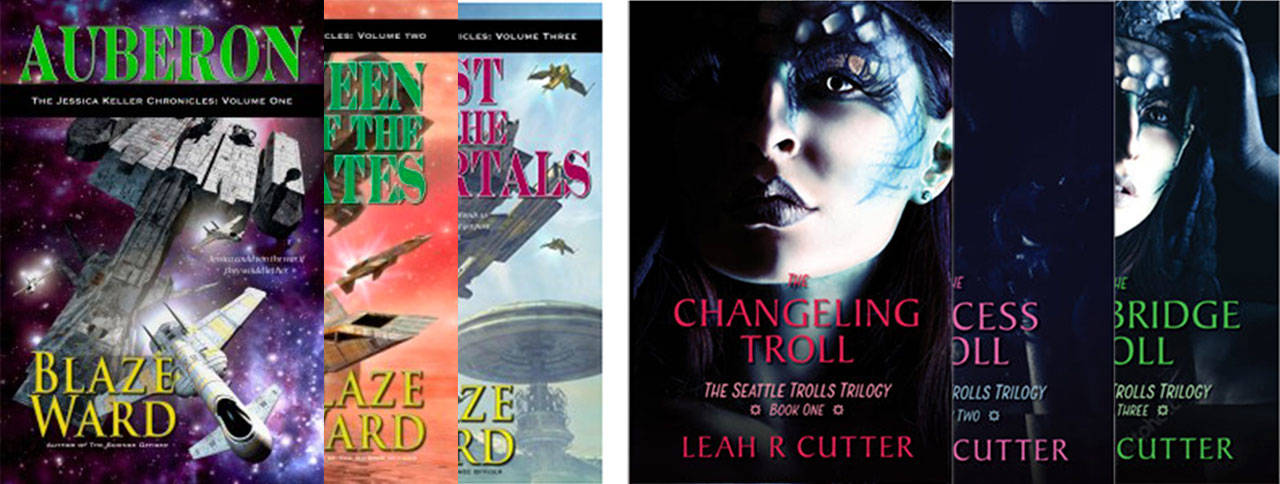They call it “pulp speed” — writing at least 1 million words a year. That’s an average of 84,000 words a month, or 2,750 words a day.
And that’s how Enumclaw authors and publishers Leah Cutter and Blaze Ward live their lives. Separately and together, they have achieved what many writers only dream about: getting paid, full time, to write. No commute. No bosses. Heck, no pants, if you want.
“The other fun part is, anybody can do it. I was talking to somebody about advice. They said, ‘What advice do you have for a young writer?’” Ward said in a recent interview. “Sit down, shut up, and write. We can get you through the other quarter, but that’s three quarters of it.”
Of course, the married couple didn’t just wake up one day and decide to live off their writing: it’s taken them years to be able to cobble together a revenue stream that has allowed them this level of independence.
And the first place to start, Ward said, is deciding what sort of writer you want to be.
“The question I always ask people is, do you want to be famous, or rich?” he said. “Famous means you go get a New York contract and an agent and your books are available in The Sequel down the street, Barnes and Nobel, and all that. As a rule, where you used to make $50,000 or $100,000 advances 20 years ago, these days its $5,000 to $10,000, if you’re lucky. And you’re making 10, 15 cents a sale. You could never quit your day job.”
“My goal in life is to be Bernie Taupin. He’s the guy who wrote all of Elton John’s music. All of it,” Ward continued. “Nobody knows who Bernie is, but… he has money.”
So if it’s money you’re after, Ward and Cutter say, you’ve got to go the independent route.
Cutter learned this her own way after a brief stint of having her books traditionally published in the early 2000s. After a brief break from writing, she discovered she could potentially make far more money if she published her work herself.
Published traditionally, the couple said, nets authors cents on every sale; but independently, especially if the book is sold virtually, the profit is much higher.
“I need to move a lot less books to support myself doing everything independently than I would traditionally,” Cutter said.
But it’s not just about writing one book, or even one series.
“You have to remember that putting out [one] book, you’re not going to make any money. You’re not suddenly going to be rich unless you rolled six 20s,” she continued, making a quick D&D reference while giving a nod to authors like Suzanne Collins and J.K. Rowling. “That first book will get you some, and it might just be a couple drops of money coming in. But then you have the next book, which gets you another couple more drops. Then the next book, which gets you some more drops. And then maybe an article, and that gets you a little bit of a stream. After the end of five to seven years, you don’t have just drops coming in — you’ve got trickles, and all those trickles turn into a really nice stream. And that’s the strategy you have to take if you’re doing long-term indie writing like we are.”
That’s where writing at pulp speed comes in.
“Today is day 300 of the year — I looked this morning — and I have averaged 3,941 words every day this year,” Ward said. “That includes days taken off, goofing off, being sick, whatever. But I’m writing 120,000 words a month, generally.”
Cutter writes at a more conservative speed at around 3,000 words a day.
That’s not easy work — the two of them take their own advice, just sitting down and writing until their daily word goal is met.
But the results are inarguable: Cutter has written seven trilogies, two quadrilogies, and 15 stand-alone novels, whereas Ward is sitting pretty on numerous long-running series and spin-offs with a total of 50 books.
Of course, when the name of the game is exposure, you can’t just stick to fiction. That’s why Cutter and Blaze also have a line of eight non-fiction books all about, well, how to write and publish, called “Business For Breakfast.”
The couple also has their own anthology magazine publications — Cutter and Ward manage their own quarterly and twice-yearly publications.
Ward has his sci-fi themed “Boundary Shock Quarterly” which just printed its 12th volume, as well as “Blaze Ward Presents”; Cutter has her quarterly “Mystery, Crime, and Mayhem” publication, which just printed its third issue, and “Cutter’s Final Cut.”
The quarterly magazines are closed syndicates — only folks who are well-known to Cutter and Ward write for them. But their twice-yearly publications are open to submissions from the public (just in case any aspiring local writers want to know that sort of information).
Their last piece of advice is well-worn, but no less valuable for it.
“Write what you love,” Cutter said. “Your passion will bring you back to the page when discipline fails you.”
To learn more about Cutter and Blaze or to check out their publications, you can head to Cutter’s publishing website, www.knottedroadpress.com, or their respective websites at www.leahcutter.com and www.blazeward.com.


